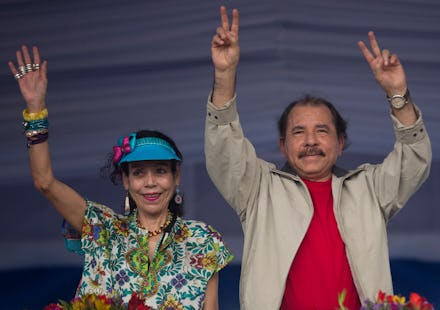The Nicaraguan presidential elections are Sunday. Here's everything you need to know.

Nicaragua is holding elections this Sunday, and current president Daniel Ortega is running for office with his wife, Rosario Murillo, as his vice presidential running mate — a "real-life House of Cards" situation, as the New York Times put it.
In addition to being the first lady of Nicaragua, Murillo is currently the communications coordinator of the Council on Communication and Citizenry.
Ortega, who is running for president for the seventh time in a row, is a "shoo-in" to win, according to the Associated Press. A poll by M&R Consultants found that 69.8% of people surveyed planned to vote for Ortega and his left-wing Sandinista National Liberation Front party, while 8.1% planned to vote for Maximino Rodriguez and his right-wing Constitutionalist Liberal Party.
Ana Margarita Vigil, president of the Sandinistas Reformist Movement, effectively challenged the integrity of the election, maintaining that the race really only has "one single candidate," because all the political parties are Ortega's allies. The "real" opposing parties, she said, were suppressed by a Supreme Court of Justice decision back in June.
How did Ortega amass so much power in Nicaragua?
Ortega first served as president of Nicaragua from 1985 to 1990. He returned to power in the 2006 election, when he was elected with 38% of the vote. His new regime started in January 2007, and though the Nicaraguan Constitution stated his term should have ended in 2011, Ortega ran for president again, and won.
The opposition — then directed by Eduardo Montealegre, former president of the Independent Liberal Party (hereto referred as the PLI, an abbreviation for its Spanish name, Partido Liberal Independiente) — claimed Ortega's re-election was fraudulent and illegal.
In 2014, Ortega reformed the Constitution with 64 votes from his deputies in the the Nicaraguan parliament and 25 votes against from the opposition parties. Thus, the door for indefinite re-election was opened again in Nicaragua, and Ortega kept the presidency and controlled all the state powers of the country.
Ortega and the 2016 election
Ortega entered the presidential race again in 2016, with an ominous twist. When he presented his wife, Murillo, as his vice presidential candidate, opposition parties claimed Nicaragua was witnessing the beginning of a dynasty much like the one Nicaragua had had for 44 years with the Somoza family.
Former deputies and opposition members in Nicaragua's government have called Sunday's election fraudulent. Vigil called it a "circus," because Ortega is virtually running alone.
"The opposition was expelled from the process in June, and only Ortega's friends were left," Vigil told Mic.
Eliseo Núñez, a former deputy from PLI, told Mic that Murillo's vice presidential candidacy is "a way to secure the familiar succession, avoiding the division in the Sandinistas party." Under Nicaraguan law, the vice president takes the presidency if something happens to the president.
If Ortega wins on Sunday — and polls suggest he will — he will be president of Nicaragua for the fourth time, and the third time in a row. By 2018, Ortega will have served the longest presidential term in Nicaraguan history: 17 years — more than the first Somoza president, who served for 16 years.